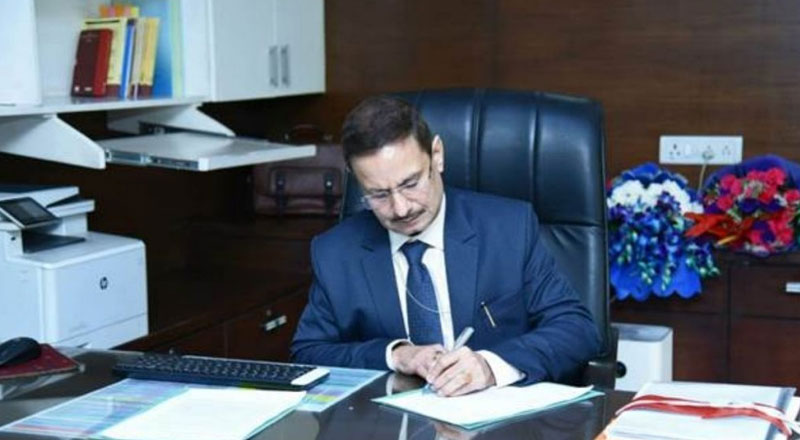Three brothers take up the cause of supplying safe drinking water to millions of people and they soon start a company together by the name JanaJal to make that happen. Explaining the modalities and the concept of JanaJal water ATM, Parag Agarwal, Founder & CMD, JanaJal, walks us through the functioning of his company’s initiatives and its roadmap
Could you throw light on the initiative of JanaJal?
JanaJal is a private sector initiative that aims to make safe drinking water available to millions of people in a sustainable and consistent manner. The company was founded by social entrepreneurs and brothers, Parag Agarwal and Anurag Agarwal who identified the gap between demand and supply of safe drinking water and decided to take up this cause with deep commitment. They understood the need to not only increase availability but also accessibility of safe water and reduce the cost of the same drastically as compared to bottled/packaged water.
What is the water ATM concept all about?
Driven by the need for sustainability in terms of operations and maintenance, the JanaJal water ATM concept was developed with the objective of ensuring consistency in the quality of water and bringing in efficiency during the water treatment process. A consumer can now walk up to a water ATM with their own container 24X7 and procure their desired quantity of water starting with a chilled glass of 300 ml water upto 20 litres which is the minimum quantity used in a household everyday for drinking and cooking. Over the past 4 years, JanaJal has contributed significantly to the concept of water ATMs being unanimously accepted as a solution to providing the much essential last mile connectivity for delivery. The concept stands validated by local administrative bodies, State and Central government and above all consumers, who are willing to pay a nominal cost to receive this invaluable resource that directly ushers health and wellness in the lives of their family and loved ones.
What kind of support do you receive from other corporates and NGOs?
Safe drinking water received attention in 2014 when Modi assumed office of the Prime Minister and highlighted the need for drinking water and sanitation in India. This was followed by the launch of the Swachh Bharat initiative that added further momentum and strength to the implementation of WASH (Water, Sanitation and Hygiene) facilities in the country. With the Government of India’s emphasis on CSR spending, corporates have developed a renewed focus on safe drinking water as its significance in terms of meeting basic needs of people is clearly understood along with the fact that the social impact being delivered is unparalleled.
JanaJal has received tremendous support from NGOs, Charitable Foundations and Corporates and implemented some landmark award winning community drinking water projects in the country. The company has developed a very unique format of engagement with corporates that mitigates their fundamental concerns about leakage of funds into unrelated areas and channelizes 100% of their CSR spending into the intended social benefit and welfare. Thus the overall objectives of all stake-holders such as the corporate and consumers are met leading to further momentum in projects being implemented pan India by JanaJal.
How do you mobilize funds?
Presently the majority of the projects are being implemented under the BOO model. The company invests its own capital to build, own and operate water ATMs in a consistent, sustainable and viable manner. Projects are also implemented in PPP mode under joint investment and collaboration with various stake-holders. However, the contribution of CSR support is rapidly increasing and is only expected to further rise in the future.
Recently JanaJal has received FDI (Foreign Direct Investment) from Tricolour Cleantech Capital, LLC a US based social impact fund that will be utilised to increase the footprint of water ATMs across railway stations, bus stands and at public places in municipal areas. With over 250 systems already operating, the company is currently in the process of commissioning 39 water ATMs through IRCTC at various railway stations in the Mumbai region and plans to achieve an installation 1000 water ATMs by 2018.
How are you spreading awareness about the work that you are doing?
JanaJal has adopted the execution strategy as the most impactful form of spreading awareness. The company believes that as more users adopt this system of procurement of water and experience the benefits of the same, the demand and appreciation will only increase thus leading to further growth in the footprint. JanaJal also has a strong social media presence and lays special emphasis on advocacy of safe drinking water and various water treatment methods so that people can be made aware of the acute need to conserve water at every level. Social awareness campaigns, road shows and events are also conducted to raise the awareness among people.
What kind of challenges have you experienced so far in your initiative?
Water remains the only utility that has not been opened up to privatisation in India. With water ATMs now being the order of the day, all local administrative bodies need to act as enablers of this unique concept that not only meets the basic need of people but also wins appreciation for their style of governance. It is important for the administration to appreciate the need for financial viability and project feasibility and ensure that projects which are implemented do not fail for want of basic essentials. Critical aspects such as vantage locations that are easily accessible to public, availability of raw water and electricity connections and above all, pricing levels that allow financial feasibility are critical to the growth of this sector.
An outstanding example of the ideal approach, planning and policies is the Indian Railways and IRCTC that have taken every aspect of project development and sustainability into consideration. Their prescribed guidelines provide for highest level of efficiency at both quantitative and qualitative levels besides financial feasibility of the companies that are being awarded the contract to install WVMs at railway stations.
Over the next 5 years, JanaJal aims to install at least 2000 WVMs with IRCTC pan India. We believe that all local administrative bodies across urban, semi-urban and rural India should adopt the IRCTC format of project implementation thereby bringing in consistency at the national policy level.
What will be your roadmap in taking this initiative to the next level?
JanaJal presently aims to cross the 1000 water ATMs mark in India by 2018. As a company we believe that there is potential to install at least one million water ATMs in this country that is estimated to become a 1.7 billion people nation by 2050. In a country where it is believed that water quality changes every 100 kms, the key to success lies solely in a technology agnostic and agile concept that is backed by execution skills of the highest order. With over 95% of the country’s population unable to afford bottled/packaged water, water ATMs are the only answer to a question that has now stood its ground for decades. The company’s R&D division is constantly working to develop new solutions such as the Hybrid water ATM that operates with electricity as well as solar energy. We also adopt lean and green water treatment technologies that can purify upto 20,000 litres per day without use of any form of energy. This enables delivery of safe water to the remotest of villages in a reliable and sustainable manner.
What kind of projects are undertaken by the government to address the issue of safe drinking water?
Our country consumes more ground water than China and US put together. With an ever increasing population, rapidly decreasing water tables and global warming increasing to alarming levels our country is poised to be severely “water stressed” by 2025. The larger concern is that lack of availability has direct adverse impact on the lives of women and young girls who are typically responsible for collecting water and spend several hours every day walking between their home and the nearest water source. This reduces the family income and hampers the child’s education.
The formation of Swachh Bharat and with collection of a central Swachh Bharat cess pool, there is a significant corpus being accumulated at the Centre which needs to be channelized into off-grid safe water projects. JanaJal is willing to offer itself as a resource to the Government of India at the thought leadership, policy formation and project execution level so that the dream of development that our country has voted for so unanimously becomes a distinct reality in the near future. After all there is no smart city without safe water being available 24X7 and water ATMs will surely be the first step towards building a smart and fully developed India.
Samrita Baruah
samrita@spoindia.org





